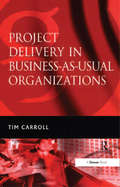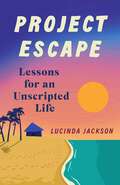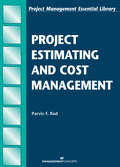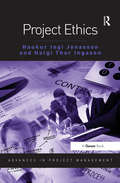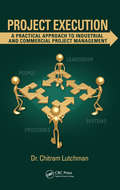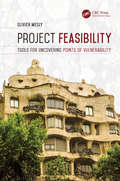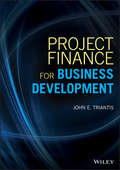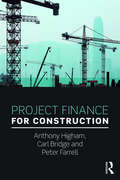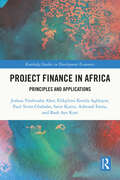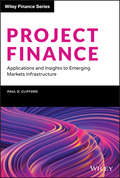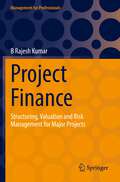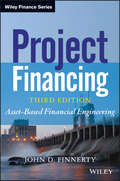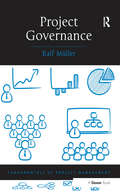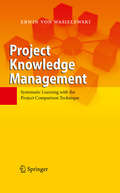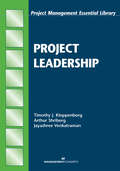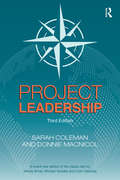- Table View
- List View
Project Delivery in Business-as-Usual Organizations
by Tim CarrollBusiness organizations are highly successful at delivering 'business as usual'; the day-to-day tasks of managing customer transactions, marketing and production activities, and motivating employees. But there is a growing requirement for such organizations also to deliver business change projects successfully. 'Business as usual organizations' represent a particularly challenging environment for achieving this because of the fundamentally different mindset and culture required to deliver projects in this context. Tim Carroll's book provides an authoritative guide to improving project delivery in such organizations by: ¢ building a project management capability and culture that is appropriate to BAU organizations; ¢ aligning projects more closely with the strategic agenda of the organization, through the use of programmes; ¢ using portfolio management to improve this alignment and ensure the effectiveness of project investments; ¢ demonstrating the business context for projects and their contribution to the organization's agenda of strategic change. The author argues convincingly that project management hasn't travelled well from its traditional roots in construction and engineering to business-as-usual organizations. New approaches are called for, in particular to embed project delivery capabilities more deeply within the organization rather than treat it as a specialist discipline. This is a 'must-read' book to help managers responsible for strategy and change in all business-as-usual organizations (such as banks, insurance, business and consumer service companies, hospitals, local and national government) to realize the value that project management can bring to the long-term development of their organization.
Project Deutschland: Unpeeling the Onion of a Distressed Real Estate Portfolio
by Nori Gerardo Lietz Ricardo AndradeJames Tallest analyzed the opportunity to invest in a distressed portfolio of high quality properties in Germany by acquiring one or more non-performing loans from Deutschland Bank. While he considers the many aspects of the deal that is about to unfold, he must decide which securities to acquire, the price he should offer to each of them, and whether to retain the former owner of the portfolio as property manager.
Project Deutschland: Unpeeling the Onion of a Distressed Real Estate Portfolio
by Nori Gerardo Lietz Ricardo AndradeJames Tallest analyzed the opportunity to invest in a distressed portfolio of high quality properties in Germany by acquiring one or more non-performing loans from Deutschland Bank. While he considers the many aspects of the deal that is about to unfold, he must decide which securities to acquire, the price he should offer to each of them, and whether to retain the former owner of the portfolio as property manager.
Project Development in the Solar Industry
by Albie Fong Jesse TippettThis book written by practicing experts in the solar renewable energy field enables readers to understand both renewable project development and the primary stumbling blocks in the process. It also contains a detailed description of all renewable energy technologies, the development activities required, and an overview to software & mapping tools commonly used in the industry. The book will not only serve as a guide to project developers but it will also assist policy makers and stakeholders in understanding the process involved to turn the sun into electricity and the reasons for supporting solar.
Project Dreamcast: Serious Play at Sega Enterprises Ltd. (A)
by Andrew Robertson Stefan ThomkeFocuses on the ongoing competitive battles in the global home video game market that is estimated to exceed $15 billion by 1999 in the United States and Japan alone. Describes how Sega Enterprises has redesigned its development processes to create a revolutionary 128-bit video game console (named Dreamcast). Having lost its leading position in an accelerating market to Sony's Playstation console, Sega is trying to reclaim its former position through an aggressive entry strategy in the Japanese market. Integral to this strategy is the ability to bring its Dreamcast console to market rapidly and to manage its relationships with independent game developers. Focuses on: 1) hardware and game software development, 2) the role of market share in an environment of increasing economic returns, and 3) the dynamics of market entry strategies as a function of development capabilities and competitive responses.
Project Escape: Lessons for an Unscripted Life
by Lucinda JacksonLucinda Jackson, a harried scientist and business executive, sets off to make a break from her corporate decades and have an “extraordinary” retirement. She launches into a five-phase “Project Escape,” complete with a vision, goals, and a scorecard of success to deliver this next chapter. Soon, Jackson and her semi-reluctant husband of thirty years are off as volunteers to the government of the Pacific island country of Palau. But while Jackson got the girl out of the corporation, even the jolt of Palau can’t fully get the corporation out of the girl. As she struggles through self-examination around purpose, identity, ego, marriage, and parenthood after years of investing so much in career, Jackson gradually learns who she is again. Whether you’re thinking ahead to retirement or are already there, Project Escape provides an unvarnished but ultimately encouraging reference in navigating the “post-career” era.
Project Estimating and Cost Management
by Parivs F. Rad PhD, PMPImprove the accuracy of project estimates and make better in-progress modifications by following the discipline-independent approach mapped out in this book. Learn the best ways to apply new tools, including a breakdown structure for both work and resources and proven estimating models. In addition, you'll gain insights into best practices for progress monitoring and cost management, as well as for dealing effectively with external projects.
Project Ethics (Advances in Project Management)
by Helgi Thor Ingason Haukur Ingi JonassonHow relevant is ethics to project management? The book - which aims to demystify the field of ethics for project managers and managers in general - takes both a critical and a practical look at project management in terms of success criteria, and ethical opportunities and risks. The goal is to help the reader to use ethical theory to further identify opportunities and risks within their projects and thereby to advance more directly along the path of mature and sustainable managerial practice. Project Ethics opens with an investigation of the critical success factors in project management. It then illustrates how situations can arise within projects where values can compete, and looks at how ethical theories on virtue, utility, duty and rights can be used as competence eye-openers to evaluate projects. The reader is challenged to think of their project management experiences where questions of competing values surfaced, and mirror them in short vignettes taken from real practice from all round the globe. Finally, a new method is introduced, based on classical ethical theory, which can help project owners, project managers, project teams and stakeholders, to identify, estimate and evaluate ethical opportunities and risks in projects.
Project Execution of Mega-Projects for the Oil and Gas Industries
by Soosaiya AnthreasThis book covers execution of mega industrial projects especially in oil and gas industries covering engineering, procurement, construction, commissioning and performance testing. It enumerates various tasks and deliverables under each discipline and sub-disciplines to define the detailed scope of work, supplies and services, as per level III of Prima Vera Schedule developed from the contract-based schedule. It gives an overall idea of how a project rolls out from commencement date to initial acceptance and executed practically with total contractor’s scope of work broken down into tasks/activities at level III platform, while highlighting that support for fool proof project execution.
Project Execution: A Practical Approach to Industrial and Commercial Project Management
by Chitram LutchmanWritten by Chitram Lutchman, a project management professional with more than 20 years of field and business experience, Project Execution: A Practical Approach to Industrial and Commercial Project Management gives you a more optimistic view of this exciting and challenging area. The book focuses on the essential requirements for successful executi
Project Feasibility: Tools for Uncovering Points of Vulnerability (Systems Innovation Book Series)
by Olivier MeslyThis book presents a set of tools that will aid in deciding whether a project should go ahead, be improved, or abandoned altogether by pinpointing its vulnerabilities. It offers a review of project feasibility analysis, and more critically, psychodynamic aspects that are often neglected, including how stakeholders interact. It provides a complement to the common techniques used for analyzing technical, financial, and marketing feasibility. The goal is to identify "hidden truths" and eliminate those gray areas that jeopardize the success of a given project. The focus is on uncovering points of vulnerabilities in four key aspects of a project: People, Power, Processes, and Plan.
Project Finance Glossary
by Benjamin C. EstyDescription: This glossary contains a list of almost 1,000 definitions for terms commonly used in the field of project finance.
Project Finance for Business Development (Wiley and SAS Business Series)
by John E. TriantisRaise the skill and competency level of project finance organizations Project Finance for Business Development helps readers understand how to develop a competitive advantage through project finance. Most importantly, it shows how different elements of project finance, such as opportunity screening and evaluation, project development, risk management, and due diligence come together to structure viable and financeable projects—which are crucial pieces missing from the current literature. Eliminating misconceptions about what is really important for successful project financings, this book shows you how to develop, structure, and implement projects successfully by creating competitive advantage. By shedding light on project finance failures, it also helps you avoid failures of your own. • Offers a roadmap for successful financing, participant roles and responsibilities, and assessing and testing project viability • Considers project finance from a broad business development and competitive advantage • Provides a strategic decision-forecasting perspective • Delves deeper than existing treatments of project finance into decisions needed to create and implement effective financing plans Helping readers develop, structure, and implement projects successfully by creating competitive advantage, this book is a useful tool for project sponsors and developers, helping them structure and implement projects by creating competitive advantage.
Project Finance for Construction
by Peter Farrell Anthony Higham Carl BridgeThe world of construction is intrinsically linked with that of finance, from the procurement and tendering stage of projects right through to valuation of buildings. In addition to this, things like administrations, liquidations, mergers, take-overs, buy-outs and floatations affect construction firms as they do all other companies. This book is a rare explanation of common construction management activities from a financial point of view. While the practical side of the industry is illustrated here with case studies, the authors also take the time to build up an understanding of balance sheets and P&L accounts before explaining how common tasks like estimating or valuation work from this perspective. Readers of this book will not only learn how to carry out the tasks of a construction cost manager, quantity surveyor or estimator, they will also understand the financial logic behind them, and the motivations that drive senior management. This is an essential book for students of quantity surveying or construction management, and all ambitious practitioners.
Project Finance in Africa: Principles and Applications (Routledge Studies in Development Economics)
by Joshua Yindenaba Abor Elikplimi Kolma Agbloyor Paul Gbahabo Saint Kuttu Ashenafi Fanta Baah Aye KusiInfrastructure drives economic growth and sustainable development by facilitating productivity, attracting foreign investment, promoting industrialisation, reducing poverty, improving standards of living, and enhancing human development. Thus, the development of project-oriented frameworks/institutions that offer long-term infrastructure financing has been identified as a core and guaranteed way to maximise economic growth and development, especially for developing regions like Africa. Project finance has a critical role in infrastructure development. This book examines the project finance ecosystem, methods, analysis, and key-related risks. Its unique contribution to the literature is its focus on Africa, where there is a huge infrastructure investment deficit and a lack of technical know-how to bridge this gap. Following a detailed introduction to project finance, the book investigates project viability, project characteristics, risk analysis and management, structure and legal issues in the context of project finance, as well as project finance markets, banks and syndicated lending, financing the deal, and the role of project advisors. It also offers insight into financial modelling and project evaluation, credit risk in project finance from the lender’s perspective, and the role of project finance in the petroleum industry. The book provides two African-related case studies of project finance. The book incorporates theoretical perspectives, valuable policy insights and resources, and offers strategies to improve and reform the structure and implementation of project finance in Africa. It provides scholarly and professionally engineered knowledge, and while each chapter explains and discusses several related issues, the case studies offer a real-life learning and teaching experience for academics and students to enhance their understanding of the issues under discussion.
Project Finance: Applications and Insights to Emerging Markets Infrastructure (Wiley Finance)
by Paul D. CliffordTackle infrastructure development projects in emerging markets with confidence In Project Finance: Applications and Insights to Emerging Markets Infrastructure, distinguished professor and author Paul Clifford insightfully applies the fundamental principles of project finance structuring to infrastructure investments in emerging markets. Using leading emerging market case studies to illuminate the underlying themes of the book, the author provides a practitioner’s perspective and incisive analysis of concepts crucial to a complete understanding of project finance in emerging markets, including: · Risk management · ESG and impact investing · The emergence of new global multilateral development banks · China’s Belt and Road Initiative Project Finance bridges the gap between theoretical infrastructure development, investment, and finance and the implementation of that theory with instructive and applicable case studies. Throughout, the author relies on a grounded and quantitative approach, combining the principles of corporate finance with straightforward explanations of underlying technologies, frameworks, and national policies. This book is an invaluable resource for undergraduate and graduate students in finance, as well as professionals who are expected to deal with project and infrastructure finance in emerging markets.
Project Finance: Structuring, Valuation and Risk Management for Major Projects (Management for Professionals)
by B Rajesh KumarLarge projects are defining moments for companies and countries. When large projects succeed, they can dramatically improve the social and economic conditions in a region. This book focuses on major aspects of the world’s largest infrastructural, industrial and public service projects through the lens of structuring, valuing, managing risk and financing projects. The book analyses and discuss large projects in government, private and public and private partnership. The author sheds light into the attributes of project finance which have unique structural elements. The book focuses on case studies related to 50 mega projects which includes infrastructural projects, energy related projects, industrial projects, roads, ports and bridges among others. This book covers both the theoretical aspects of financing of mega projects and the practical applications by including case studies of the world’s largest projects in terms of value.
Project Financing: Asset-Based Financial Engineering
by John D. FinnertyA timely update to one of the most well-received books on project financing As an effective alternative to conventional direct financing, project financing has become one of the hottest topics in corporate finance. It's being used more and more frequently-and more successfully-on a wide variety of high-profile corporate projects, and has long been used to fund large-scale natural resource projects. But the challenges of successful project financing are immense, and the requirements of the process can easily be misunderstood. That's why John Finnerty has returned with the Third Edition of Project Financing. Drawing on his vast experience in the field, Finnerty takes you through the process step by step. Using updated examples and case studies that illustrate how to apply the analytical techniques described in the book, he covers the rationale for project financing, how to prepare the financial plan, assess the risks, design the financing mix, raise the funds, and much more. Includes completely new chapters that cover the financing of sustainable projects as well as Sharia-compliant (Islamic) project financing New material has been added to the discussion of financial modeling and international debt financing Explores today's most innovative financing techniques and analyzes the shortcomings of unsuccessful project financing attempts Whether you're a corporate finance professional, project planner, or private investor, Project Financing, Third Edition demystifies the complexities of project financing and provides an invaluable guide for anyone who wants to master innovation in corporate finance today.
Project Governance
by Terry M. WilliamsLarge projects are complex undertakings representing major investments. Often problems arise because of failure at the start of a project in terms of establishing governance, choosing the appropriate concept, analyzing the proposal and environment, and maximizing the utility of the investment, all within complex and political decision-making structures. As a result, many projects fail even though they were implemented successfully, simply because the project concept was wrong. While attention has been paid to project execution, this area is under represented in literature. However, considerable advances have been made, both practical and in putting the behaviour and management of major projects on a proper theoretical basis. This volume therefore provides a resume of the state of this domain. It is a guide for practitioners, decision-makers and their advisors, as well as students. It takes a narrow view of the project, widening to place it within the organization, then the organizational nexus, and finally the political environment, to give a holistic view on how bad ideas can be avoided and good ideas developed into successful projects. "
Project Governance (Fundamentals of Project Management)
by Ralf MullerWithout a governance structure, an organization runs the risk of conflicts and inconsistencies between the various means of achieving organizational goals, the processes and resources, causing costly inefficiencies that impact negatively on both smooth running and bottom line profitability. However, the frequency of projects failing to meet these corporate objectives has focused attention firmly on the process of project governance. In this book, Ralf Müller provides a well-researched framework to explain the different preferences organizations have in goal setting, along with the best-practices, roles and responsibilities related to governance tasks. This concise text is an important guide for project and programme managers, those managers concerned with corporate governance such as risk managers and internal auditors, project sponsors and project board members, as well as academics researching organizational and project performance. Project Governance is part of the Gower Fundamentals of Project Management Series. Practising professionals and project students will find in the fundamentals a definitive, shorthand guide to each of the main competencies associated with project management; a book that is authoritative, based on current research but immediately relevant and applicable.
Project Helios: Harvesting the Sun
by E. Scott Mayfield Mark Egan"In late 2017, Ashley Telkes gazed across the sunlit woods adjacent to her home near Boston, Massachusetts. The sunny day reminded her of the decision she needed to make regarding her home. A marine biologist, Telkes was acutely aware of the impact that modern society was having on the environment and, to this end, she had tried to be cognizant of her own impact on the environment. Since purchasing her home, Telkes had pursued a number of passive measures to minimize her “carbon footprint,” including re-insulating the roof and walls, opting for ceiling fans instead of air conditioning, and replacing incandescent lights with energy efficient LED bulbs. However, she was now confronted with a much bigger decision: whether or not to invest in solar panels to generate electricity for her home."
Project Identification: Capturing Great Ideas to Dramatically Improve Your Organization
by Jr., Charles TryonOrganizations of every type struggle to remain relevant in their marketplace. They continuously strive to introduce new products and services at a rate that satisfies their customers. In their search for fresh ideas, organizations often overlook the most significant source of new thought- their employees. Today's employees are knowledgeable and able to see opportunities or solutions to problems. This book describes a process for turning great ideas into actionable proposals. It presents a simple, but powerful set of questions that has proven to deliver a never-ending stream of inspiration to an organization.
Project Knowledge Management
by Erwin Von WasielewskiThis is the first English book on Project Comparison Technique, i.e. comparative project prognoses, project theory, project evaluation, and project benchmarking in all branches. It facilitates the first steps towards project comparisons for project management experts and scientists, details possible approaches and relates real-world experiences. While readers are assumed to have some knowledge of project management, the mathematical and statistical aspects are explained. For the first time in the history of project management we show that the efficiency of project realizations can be evaluated objectively and numerically in detail and as a whole, and how to do so. We lay out the first comprehensive, scientifically founded characteristics system for projects, formulate the first mathematical project model, demonstrate the usefulness of the characteristics system with authentic projects, and show how to handle the new tools and how to present them in tables and diagrams.
Project Leadership
by Timothy J. Kloppenborg PhD, PMP Arthur Shriberg EdD Jayashree Venkatraman MS, MBAThis book traces the development of project leadership as fundamental to completing projects effectively, delineates the leadership tasks that must be accomplished at each step of a project's life, and helps the reader develop wisdom in making decisions both by learning the ramifications of certain decisions and by seeing how those decisions are made in an example project.
Project Leadership (Advances In Project Management Ser.)
by Sarah Coleman Donnie MacNicolProject Leadership, the classic, best-selling textbook originally by Wendy Briner, Michael Geddes and Colin Hastings, anticipated so many of the changes in approaches to project management that are now regarded as mainstream - not least the focus on behaviours. The Third Edition by experts Sarah Coleman and Donnie MacNicol has been substantially rewritten, introducing new material and experience reflecting the transformation that has taken place in the world of projects and leadership. Project Leadership Third Edition looks at the nature of the leadership role in projects, why it is significant and how it impacts the processes throughout the project life-cycle from shaping and scoping, start up and delivery through to project closure. The authors put considerable emphasis on a set of core capabilities around the themes of vision and strategy, relationship building, communication and engagement. The book also focuses on building personal and organizational project leadership capability including models, tools and diagnostics drawing on experiences of working with projects and organizations from multiple sectors and across the globe. The Foreword and Endorsements have been provided by industry leaders. Sarah Coleman and Donnie MacNicol have retained and built on the wonderful range of simple, imaginative and very applicable models and perspectives developed by the previous authors. Every project leader, aspiring project leader and organization with project management communities should own and use a copy of this book.
